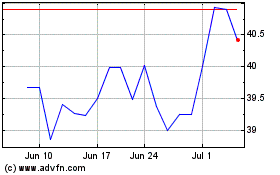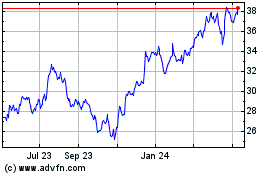Local Entrepreneurs Embrace Self-Sacrifice,
Work Longer Hours Than Any Other Market Surveyed
Seven years after the Great Recession, nearly two-thirds of
Boston small business owners (65 percent) report their businesses
are still recovering, according to the spring 2015 Bank of America
Small Business Owner Report, a semi-annual study exploring the
concerns, aspirations and perspectives of small business owners in
Boston and around the country.
Though many feel that they have not completely recovered, the
survey found that Boston entrepreneurs have been working long
hours, forgoing raises and delaying their own compensation as they
focus on their employees and customers. In fact, Boston small
business owners are working longer hours than any other market
surveyed, including New York and Washington, D.C. Eighty-six
percent of small business owners in Boston work more than 40 hours
a week, with 38 percent working over 60 hours a week. The majority
(57 percent) have never rewarded themselves with a raise, or
haven’t done so in more than two years.
“Boston entrepreneurs are still feeling the effects of the Great
Recession, but they’re resilient individuals who remain positive
and passionate about their businesses,” said Colleen Matteson,
Boston small business banker manager at Bank of America. “They’re
working hard to stay focused on growth and they value their
employees and customers above all else, often at their own
expense.”
Boston small business owners demonstrate self-sacrifice;
prioritize employees and customersBoston small business owners
are prioritizing the needs of employees and customers before their
own. The survey reveals that 41 percent have delayed or forgone
compensation for up to two weeks for the betterment of their small
business, which is 9 percent higher than the national average (32
percent). Additionally, more than two-thirds (68 percent) would
rather delay or reduce their own compensation than take other
courses of action to make ends meet; this includes scaling back on
services they offer customers (9 percent) or delaying/ reducing
compensation for their staff (7 percent).
Almost all (94 percent) Boston small business owners say they
have employee appreciation programs, including:
- Dinners and outings (51 percent).
- Spot bonuses (45 percent).
- Office recognition (36 percent).
They also provide work-life balance benefits for employees,
including:
- Flexible hours (60 percent).
- Closure on major holidays (53
percent).
- Paid vacation time (41 percent).
The majority of Boston small business owners (63 percent) cite
that establishing relationships with customers and clients is the
primary driver of repeat business, and they find many ways to show
their appreciation, including:
- Monetary rewards, such as discounts or
free upgrades (30 percent).
- Referral programs (27 percent).
- Social media promotions (26
percent).
- Personalized gifts (26 percent).
Additionally, 69 percent says a primary way in which they have
adapted to customer demands is by becoming more technologically
savvy, which is 7 percent higher than the national average.
Boston entrepreneurs are more optimistic about business
growth, hiring plans and the economy from one year agoAlthough
many Boston entrepreneurs feel that they have not completely
recovered from the recession, 64 percent plan to grow their
business over the next five years, which is a 10 percent increase
from findings in the spring 2014 Small Business Owner Report.
When looking at staffing, 49 percent of Boston entrepreneurs say
they expect to hire more employees this year, which is an 8 percent
increase from one year ago. Despite these hiring projections, more
than half of Boston small business owners (51 percent) say that
it’s difficult to find qualified candidates (41 percent
nationally). They say the top challenges in finding qualified staff
are attributed to a skills gap (56 percent) and high salary demands
(46 percent).
In addition to their optimism for the future of their
businesses, Boston entrepreneurs are feeling confident about the
economy. The majority (51 percent) believe that the national
economy will improve over the next year, which is up 12 percent
from last year. They’re also feeling positive about their local
economy, with 48 percent saying it will improve over the next 12
months, a 7 percent increase in confidence from one year ago.
Boston small business owners have concerns about
effectiveness of U.S. government leaders and health care
costsOnly 29 percent of Boston entrepreneurs feel appreciated
by policymakers. When asked about the impact of specific government
policies, local small business owners say the greatest potential
for a positive impact on their business could come from expanded
tax breaks for automatically enrolling employees into retirement
savings accounts (33 percent) and incentives to keep jobs on U.S.
soil (26 percent). Conversely, they say the policies that would
have the greatest negative impact on their business would be
required health care plans for employees (38 percent) and mandated
sick leave for employees (28 percent). Although they cite required
health care plans as a top policy that could have a negative impact
on their business, 41 percent offer health care benefits, which is
higher than any other market surveyed.
Though overall business and economic optimism is on the rise,
Boston entrepreneurs still have concerns over specific issues. The
effectiveness of U.S. government leaders (66 percent) is their
number one concern, followed by health care costs (64 percent),
though concern over health care costs is down from 80 percent six
months ago.
For an in-depth look at the attributes of the nation’s small
business owners, read the full spring 2015 Bank of America Small
Business Owner Report, and for additional Boston-based insights,
download the Small Business Owner Report Boston infographic
here.
About the Bank of America Small Business Owner ReportBraun
Research conducted the Bank of America Small Business Owner Report
survey by phone, from March 4, 2015, through March 27, 2015, on
behalf of Bank of America. Braun contacted a
nationally-representative sample of 1,000 small business owners in
the United States with annual revenue between $100,000 and
$4,999,999 and employing between 2 and 99 employees. In addition,
300 small business owners were also surveyed in each of nine target
markets: Los Angeles, Dallas, Washington, D.C., New York, Boston,
Chicago, San Francisco, Atlanta and Miami. The margin of error for
the national sample is +/- 3.1 percent; the margin of error for the
oversampled markets is +/ 5.7 percent, reported at a 95 percent
confidence level.
The Braun Research survey results conducted on behalf of Bank of
America and interpretations in this release are not intended, nor
implied, to be a substitute for the professional advice received
from a qualified accountant, attorney or financial advisor. Always
seek the advice of an accountant, attorney or financial advisor
with any questions you may have regarding the decisions you
undertake as a result of reviewing the information contained
herein. Nothing in this report should be construed as either advice
or legal opinion.
Bank of AmericaBank of America is one of the world's largest
financial institutions, serving individual consumers, small and
middle-market businesses and large corporations with a full range
of banking, investing, asset management and other financial and
risk management products and services. The company provides
unmatched convenience in the United States, serving approximately
48 million consumer and small business relationships with
approximately 4,800 retail financial centers and approximately
15,900 ATMs and award-winning online banking with 31 million active
users and approximately 17 million mobile users. Bank of America is
among the world's leading wealth management companies and is a
global leader in corporate and investment banking and trading
across a broad range of asset classes, serving corporations,
governments, institutions and individuals around the world. Bank of
America offers industry-leading support to approximately 3 million
small business owners through a suite of innovative, easy-to-use
online products and services. The company serves clients through
operations in all 50 states, the District of Columbia, the U.S.
Virgin Islands, Puerto Rico and more than 35 countries. Bank of
America Corporation stock (NYSE: BAC) is listed on the New York
Stock Exchange.
Visit the Bank of America newsroom for more Bank of America
news.
www.bankofamerica.com
Reporters May Contact:T.J. Crawford, Bank of America,
1.646.855.3301tj.crawford@bankofamerica.com
Bank of America (NYSE:BAC)
Historical Stock Chart
From Mar 2024 to Apr 2024

Bank of America (NYSE:BAC)
Historical Stock Chart
From Apr 2023 to Apr 2024
